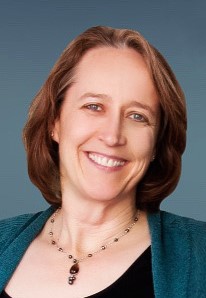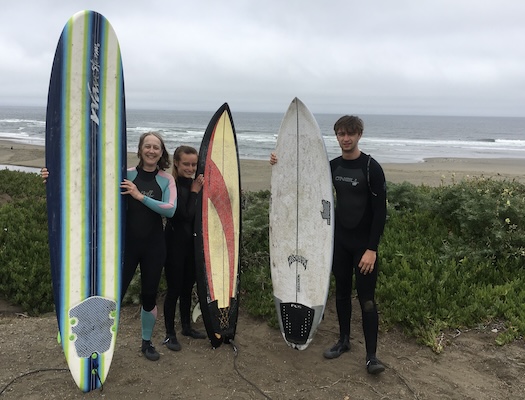
Student Spotlight: Elizabeth Carty
 Elizabeth Carty, a third year student in the Wright Institute’s Counseling Psychology Program, was born and raised in Washington, D.C.. The youngest of three children, she had a brother seven years older and a sister just eighteen months her senior. Elizabeth attended a private school for her K-12 education. “The social and emotional support I got at school saved me,” Elizabeth reflected. For her undergraduate studies, Elizabeth attended Wesleyan University in Connecticut. “I majored in Latin American history to expand my worldview and develop my writing and analytical skills,” she explained.
Elizabeth Carty, a third year student in the Wright Institute’s Counseling Psychology Program, was born and raised in Washington, D.C.. The youngest of three children, she had a brother seven years older and a sister just eighteen months her senior. Elizabeth attended a private school for her K-12 education. “The social and emotional support I got at school saved me,” Elizabeth reflected. For her undergraduate studies, Elizabeth attended Wesleyan University in Connecticut. “I majored in Latin American history to expand my worldview and develop my writing and analytical skills,” she explained.
During her senior year of college, Elizabeth attended a lecture by a photographer who shared photos of impoverished communities. “I decided at that moment that I had to work in human services,” she recalled. “The next day, I went to the shelter in town to volunteer and have been working in human services in one way or another ever since.” After college, Elizabeth drove across the country to California in an orange VW bus. “I never looked back,” she reflected. “The natural beauty and progressive culture here in California never cease to amaze me.”
Once she settled in San Francisco, Elizabeth began work at Conard House in 1988, first as a Bilingual (Spanish) Case Manager and then as the Program Director. “I worked in San Francisco’s Mission and Tenderloin districts, assisting adults seeking support with mental illness and substance use,” she recalled. “I was promoted to director and felt like I had a bigger impact in a leadership role, but after six years, I was feeling somewhat burned out.” Elizabeth enrolled in the master’s of social work program at UC Berkeley, focusing on gerontology and administration. She graduated in 1997 with her master’s in social welfare.
While studying at UC Berkeley, Elizabeth discovered the PACE (Program of All-Inclusive Care for the Elderly) model, which she referred to as the “gold standard” in eldercare. PACE coordinates community-based care for elders who are in need of assistance but want to stay in their own homes. "All the care is provided, paid for and coordinated by the specialized PACE care team, including medical care, medications, physical therapy, and help in the home,” she explained. “Elders in PACE live longer, healthier, more engaged lives and families receive vital support they also need.” This inspired Elizabeth to pursue a career in eldercare, specifically using the PACE model.
Over the subsequent twenty-five years, Elizabeth worked in executive leadership roles at three California PACE organizations. From 1997-2009, she worked at the Center for Elders’ Independence based in Oakland, first as their Director of Planning, then as their Chief Operating Officer. Elizabeth was the Director of Consulting at On Lok Inc. in San Francisco from 2010-2016, where she led training programs for PACE administrators. Then she was the Chief Regulatory Affairs Officer of Welbehealth from 2016-2021, where she was a founding member of the executive team for a for-profit PACE program that rapidly opened new PACE programs in underserved areas across California.
Looking back on that portion of her career, Elizabeth has many accomplishments to be proud of. During her twelve years at Center for Elders’ Independence, she led the company out of two crises, one regulatory and one budgetary. “Partnering with everybody and being collaborative and fair was the only way out,” she shared. “Listening felt like my key because when people feel heard, it's regulating.” Her humility and commitment to the success of the organization were on display when she willingly cut her own pay as well. “I am most proud of leading with integrity and humility supporting caring, talented team members (aides, drivers, doctors, nurses, social workers, rehab therapists and others) to provide compassionate services to some of our most vulnerable citizens,” she reflected.
In 2021, Elizabeth decided to make a change in her career path. “After raising two children while working full time as an administrator for decades, I simply hit a wall with the responsibility for managing anyone or anything,” she explained. “I reflected on what I enjoyed most work-wise and it was my relationships, and particularly for those I was mentoring.” Around that time, Elizabeth read Dr. Bessel van der Kolk’s book The Body Keeps the Score: Brain, Mind, and Body in the Healing of Trauma and was shocked to see how much the field of psychology had changed since her early social work experiences. “Having worked in mental health in the 1980’s before Prozac, dialectical behavior therapy, EMDR and many other modern modalities existed or were widely available, I was blown away by how many ways there were to help people,” she recalled. “I felt called to re-join in the effort - especially given that I struggled so much myself as a young adult.” She began to explore her options for pursuing a career in psychology.
Elizabeth decided to apply to the Wright Institute’s Counseling Psychology Program and began her studies in the fall of 2022. “The in-person classes model and social justice focus at the Wright Institute was most appealing to me of all the psychology program options,” she explained. She quickly formed bonds with her cohort, who made a concerted effort to support and look out for one another. “We enjoyed activities (e.g. Picante lunch, Barbie movie, Strawberry Creek picnics) outside of school, shared resources and quizlets, and made the most of this learning experience together,” she shared. “I was the oldest in the cohort by over a decade and the big age spread from twenty-four to sixty made for rich discussions.” By building these connections, Elizabeth’s cohort members were able to lean on and lift up one another.
Over the past two years, Elizabeth has thoroughly enjoyed her studies at the Wright Institute. “I appreciate how steeped the coursework is in social justice theory and practice,” she reflected. “It has challenged and humbled me in deeply meaningful ways.” She has also enjoyed all of her professors. “I’ve found them to be energetic, authentic and talented at preparing and facilitating robust, relevant courses,” she explained. “They share how they work with clients through stories and demonstrations, which has been incredibly inspiring.” Elizabeth's experience at the Wright Institute has been profoundly enriching thus far, leaving her both inspired and well-prepared to apply her knowledge in the field.
Elizabeth made the choice to defer her practicum to a third year, allowing her to focus more on her second year coursework. “I really enjoy the reading and I had heard that it was hard to keep up with the readings in the second year,” she recalled. “I had also been pushing myself, pedal-to-the-metal, for 20 years, and I just decided there's no need to do that right now.” Elizabeth expressed her gratitude that she’s in a position in her life to be able to pace herself in the program, noting that financial barriers prevent many students from doing the same.
In order to keep developing her own skills while her peers began their practicum placements, Elizabeth began doing volunteer work. Since June 2023, Elizabeth has been volunteering as a Crisis Line Volunteer for Crisis Support Services of Alameda County. “I signed up to volunteer at Crisis Support Services of Alameda County to contribute, receive training, and also to practice counseling skills while I deferred my WI practicum,” she explained. Elizabeth has found this work to be extremely rewarding. “The training was excellent,” she reflected. “I am constantly astounded at how effective the Crisis Line program is at supporting people in moments of crisis.”
Last October, Elizabeth also began volunteering as a co-facilitator at Pacific DBT Collaborative. She worked with a group of young adults, which is an age group she noted she has a “sweet spot” for. “I completely fell apart at eighteen, really struggled as a young adult, and barely made it through college,” she admitted. “Becoming a young adult is a big big transition and it's even harder now, the world the way it is.” Although she only volunteered a few hours each week, Elizabeth gained extensive experience with DBT.
This fall, Elizabeth begins her practicum at Bay Area Community Resources, which came highly recommended by her peers and professors. “They have a reputation for excellent training and supervision,” she explained. “Now is the time we need that. I’ve done a lot of other things, but I haven’t done this!” Elizabeth is excited about getting her first experience working in a school environment. “I know as a school counselor, you’re there for the kids, but I'm going to be looking for ways to see if I can support the parents as well,” she added. “Parenting is the hardest job there is, as far as I’m concerned, and the most important.”
 Elizabeth is excited to be part of the student mentor team this year, which she hopes will keep her connected to the community during her third year. “Being a part of the Wright community has been so meaningful to me,” she shared. “I wanted to stay engaged and support the amazing work the staff and professors are doing in this field.” She also pointed out that, as someone who has been through graduate school twice now, she’s uniquely qualified to help her fellow students as they navigate the ups and downs of the graduate school experience.
Elizabeth is excited to be part of the student mentor team this year, which she hopes will keep her connected to the community during her third year. “Being a part of the Wright community has been so meaningful to me,” she shared. “I wanted to stay engaged and support the amazing work the staff and professors are doing in this field.” She also pointed out that, as someone who has been through graduate school twice now, she’s uniquely qualified to help her fellow students as they navigate the ups and downs of the graduate school experience.
After graduating from the Wright Institute, Elizabeth’s primary goal is to find a way to ease suffering for a group of people. “I would work with any age, so it'll be a bit of serendipity,” she laughed. “I keep hearing there's a big, big need, so I'll follow where the need is.” Given her wide range of interest, it’s likely that Elizabeth’s biggest challenge will be narrowing her scope. Thankfully, time has taught her the importance of work-life balance and she will take that mindset with her into her new career. Regardless of where her career takes her, she’ll set aside plenty of time for cooking, gardening, shooting pool, and making memories with her family and friends.
